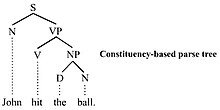
| Part of a series on |
| Linguistics |
|---|
|
|
In linguistics, the term formalism is used in a variety of meanings which relate to formal linguistics in different ways. In common usage, it is merely synonymous with a grammatical model or a syntactic model: a method for analyzing sentence structures.[3][4] Such formalisms include different methodologies of generative grammar which are especially designed to produce grammatically correct strings of words;[5] or the likes of Functional Discourse Grammar which builds on predicate logic.[6]
Additionally, formalism can be thought of as a theory of language. This is most commonly a reference to mathematical formalism which argues that syntax is purely axiomatic being based on sequences generated by mathematical operations. This idea stands in contradistinction to psychologism and logicism which, respectively, argue that syntax is based on human psychology; or on semantic a priori structures which exist independently of humans.[7]
- ^ Schäfer, Roland (2016). Einführung in die grammatische Beschreibung des Deutschen (2nd ed.). Berlin: Language Science Press. ISBN 978-1-537504-95-7.
- ^ Butler, Christopher S. (2003). Structure and Function: A Guide to Three Major Structural-Functional Theories, part 1 (PDF). John Benjamins. pp. 121–124. ISBN 9781588113580. Retrieved 2020-01-19.
- ^ Bussmann, Hadumod (1998). Routledge Dictionary of Language and Linguistics. Routledge. ISBN 3-520-45202-2.
- ^ Crystal, David (2008). A Dictionary of Linguistics and Phonetics. Blackwell. ISBN 978-1-405-15296-9.
- ^ Seuren, Pieter (2015). "Prestructuralist and structuralist approaches to syntax". In Kiss and Alexiadou (ed.). Syntax--Theory and Analysis: An International Handbook. De Gruyter. pp. 134–157. ISBN 9783110202762.
- ^ Anstey, Matthew P. (2004). "Functional Grammar from its inception". In Mackenzie, J. L.; Goméz-González, M. A. (eds.). A New Architecture for Functional Grammar. De Gruyter. pp. 23–72. ISBN 9783110197112.
- ^ Kusch, Martin (2020). "Psychologism". In Zalta, Edward N. (ed.). Stanford Encyclopedia of Philosophy. Stanford University. ISSN 1095-5054. Retrieved 2021-07-11.
